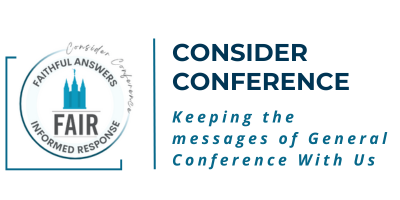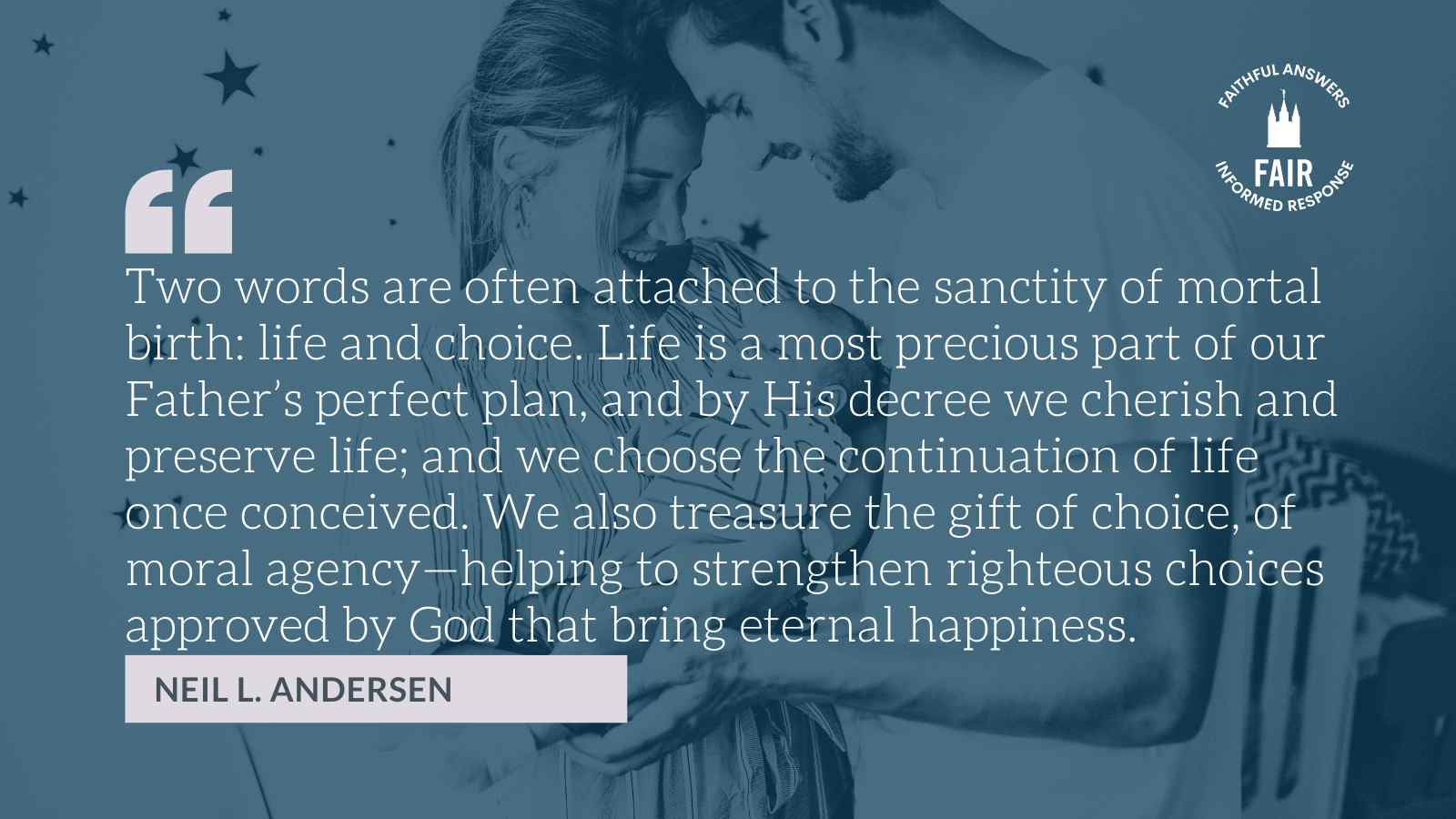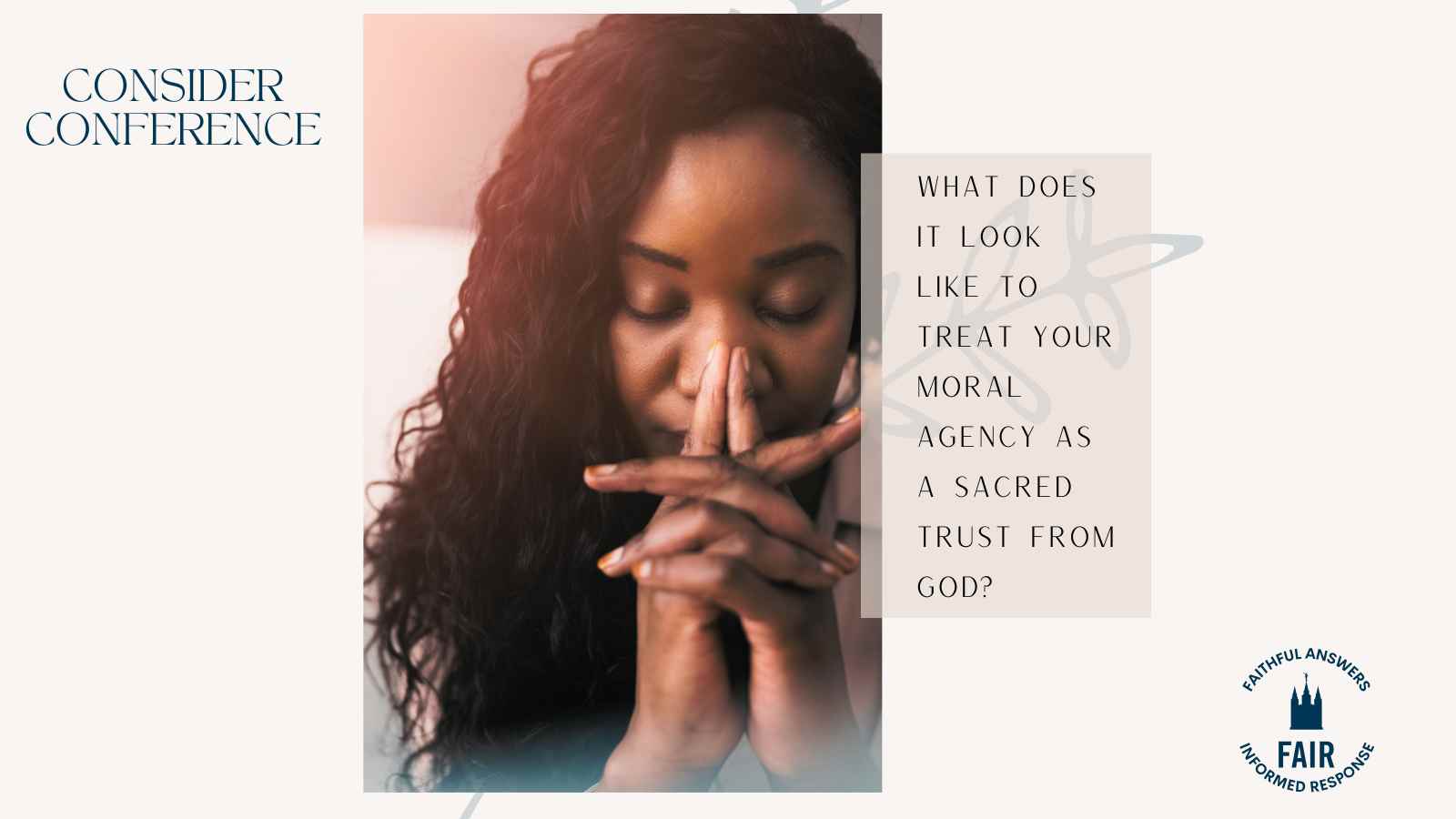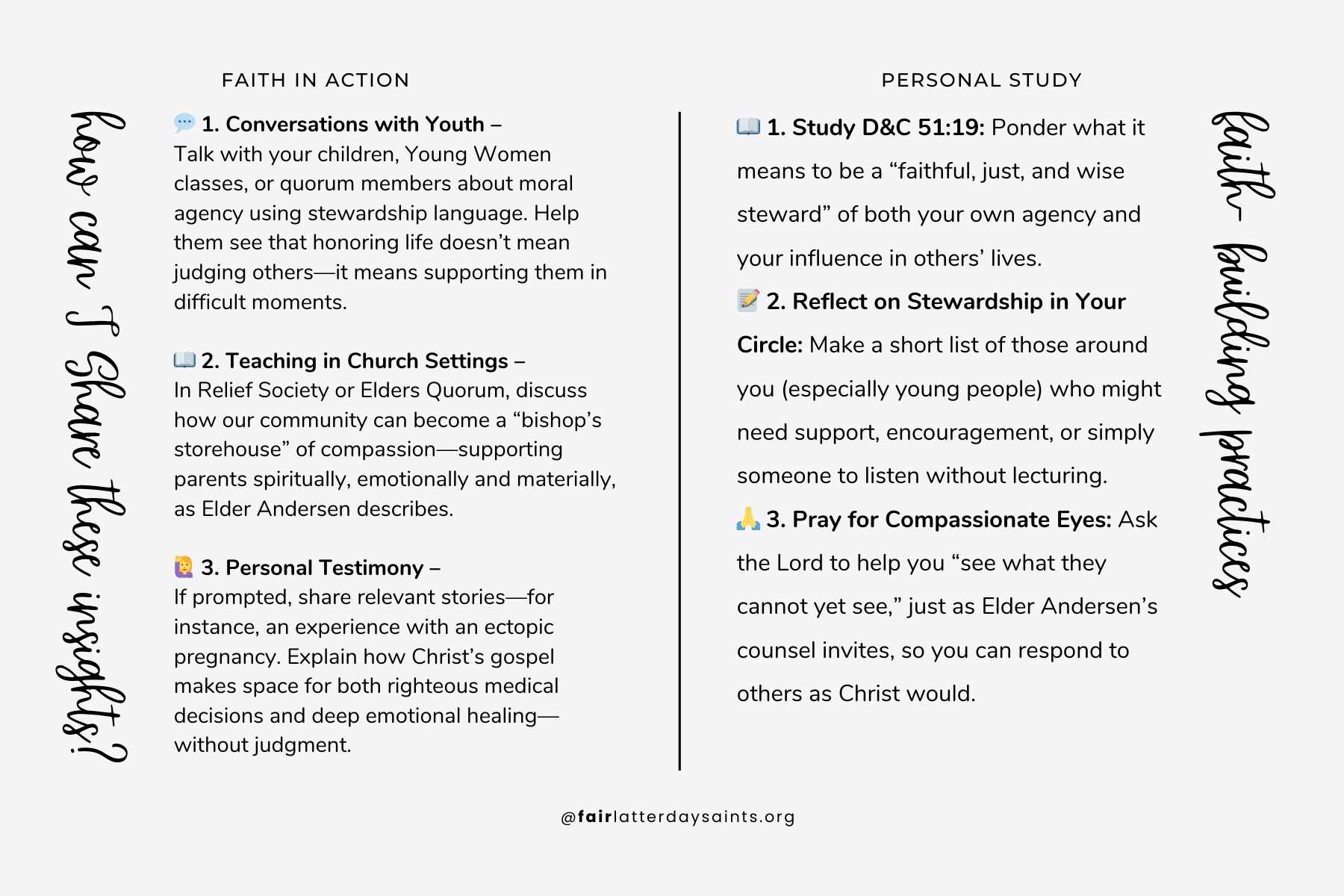
Discipleship, Stewardship, and the Call to Compassion
In a world where the topic of abortion is often weaponized and polarized, what does it look like to truly cherish life as a disciple of Jesus Christ?
In his tender and courageous message, Cherishing Life, Elder Neil L. Andersen speaks not only to those facing unplanned pregnancies—but more urgently, to the rest of us. He teaches that defending the sanctity of life is not a political stance, but a divine responsibility, and that the moral choices surrounding life invite compassionate stewardship, not judgment.
Elder Andersen reframes agency not as personal entitlement, but as a trust from God, especially when it involves the most vulnerable among us—the unborn and those in distress. He invites us to consider how our own words, hands, and hearts can bring light, hope, and clarity to those navigating some of life’s most fragile decisions.
How can we become better stewards of not just our own agency—but of the burdens and needs of those around us? How do we defend truth without losing tenderness?

Apologetic Issues: Sanctity of Life and Stewardship of Agency
Misconception: “You can’t be a good Latter-day Saint if you believe abortion should ever be legal.”
Response:
This claim oversimplifies and politicizes the Church’s doctrine. Elder Andersen teaches that cherishing life is a moral and spiritual principle, not a partisan agenda. The Church of Jesus Christ of Latter-day Saints opposes elective abortion for personal or social convenience—but it also allows for prayerfully considered exceptions (such as rape, incest, or when the mother’s life is in danger). Making blanket statements like “You can’t be a good Latter-day Saint if you support abortion in any case” risks weaponizing faith for political purposes. Gospel truth is not a tool for signaling party loyalty or moral superiority. Elder Andersen doesn’t call for judgment; he calls for ministering: “Our words, our hands, our hearts… can bless them to feel the Savior’s love.” To cherish life is not to condemn others. It’s to walk with them in their pain, offer support, and uphold life with compassion and clarity—not contention.
Common Fallacy: Moral Purity Test / Political Hijacking – This misconception arises from two overlapping fallacies:
- No True Scotsman Fallacy – claiming someone isn’t a “true” Latter-day Saint because they don’t meet a rigid ideological test.
- Moral Equivocation (Political Hijacking) – substituting Church doctrine with political opinion and calling it revelation.
Correction: The Church’s position is grounded in eternal truth and prophetic consistency, not political platforms. Good disciples don’t use doctrine as a bludgeon—they use it to build bridges, extend compassion, and speak truth with love.
Criticism: “Church teachings on abortion violate a woman’s agency.”
Response: The doctrine of moral agency teaches that God honors our freedom to choose—but also holds us accountable for choices that affect others, especially in matters of life. Elder Andersen affirms that agency is not a free-for-all, but a sacred stewardship. We are not owners of life, but stewards of the gift of creation—and we are called to use our agency in alignment with divine principles that protect and cherish life. As Elder Andersen explains, “We also treasure the gift of choice, of moral agency—helping to strengthen righteous choices approved by God that bring eternal happiness.” Importantly, Elder Andersen does not call for shame or condemnation. Instead, he calls on the rest of us to act as stewards too: lifting, loving, and supporting those in fragile, complex circumstances. In situations like ectopic pregnancies or other reproductive challenges—where the medical, emotional, and spiritual terrain is complicated—Elder Andersen’s framework makes room for ministering, not judging.
Common Fallacy: False Dilemma – This criticism presents a false dilemma, suggesting we must choose between honoring a woman’s agency or valuing an infant’s life.
Correction: In reality, the doctrine of stewardship allows us to hold both truths simultaneously. We can honor moral agency and uphold the sacredness of life—while offering compassion to those navigating impossibly hard decisions.

Apologetic Application: Moral Agency as Sacred Stewardship
Core Doctrine: Moral agency is a sacred stewardship entrusted to each soul by God, meant to be exercised in alignment with divine law and with reverence for the gift of life.
 This doctrine helps clarify why Latter-day Saints advocate for life while still offering grace and support to those facing reproductive crises. A faithful disciple can oppose elective abortion while still ministering tenderly to someone recovering from one, or grieving after an ectopic pregnancy or miscarriage.
This doctrine helps clarify why Latter-day Saints advocate for life while still offering grace and support to those facing reproductive crises. A faithful disciple can oppose elective abortion while still ministering tenderly to someone recovering from one, or grieving after an ectopic pregnancy or miscarriage.
Defending Core Beliefs
1⃣ Agency Does Not Equal Autonomy Without Accountability
Some assume that honoring moral agency means endorsing all choices equally, but the scriptures and prophetic teachings clarify that agency is meaningful only within the context of divine accountability. As the Lord taught: “Behold, these thy brethren… I gave unto them their knowledge… and gave I unto man his agency… and also given commandment, that they should love one another, and that they should choose me, their Father.” (Moses 7:32–33) Elder Andersen builds on this scriptural foundation by teaching that agency is meant to be used to choose righteousness—especially when it involves the creation or ending of life. This refutes the idea that the Church is restricting freedom; instead, it affirms that freedom without moral guardrails isn’t divine—it’s dangerous.
2⃣ Stewardship Includes Both Agency and Support
Elder Andersen extends the doctrine of stewardship beyond individual decisions and applies it to the faith community as a whole. He teaches that we all hold a sacred responsibility to help others see clearly when they are in crisis—not to judge or condemn, but to minister with compassion. “Our words, our hands, our hearts—spiritually, emotionally, and financially—can bless them to feel the Savior’s love…” In doing so, he reframes our moral responsibility: we are stewards not only of our own agency, but also of the support, empathy, and Christlike love we offer to others—especially in life-and-death moments.
Practical Apologetic Use: When critics claim the Church lacks compassion in this area, we can point to Elder Andersen’s invitation—not to pass judgment, but to minister. We are called to act in ways that lift and clarify, not condemn. It’s a Church that calls not just for doctrine, but for discipleship in action.
Historical and Doctrinal Connections
In May 1831, as Saints arrived in Ohio from the eastern United States, the Lord revealed Doctrine and Covenants 51 to guide the organization of consecrated resources under Bishop Edward Partridge. This revelation established foundational principles of stewardship: that individuals would receive portions according to their circumstances, and that each Saint was accountable for their use of what the Lord had entrusted to them. The Lord declared:
Whoso is found a faithful, a just, and a wise steward shall enter into the joy of his Lord, and shall inherit eternal life. (D&C 51:19)
While this originally referred to temporal resources, the principle applies broadly: every gift from God—property, position, influence, time, and agency—is a stewardship.
 Doctrine and Covenants Connection:
Doctrine and Covenants Connection:
Elder Andersen’s talk invites us to apply this Restoration-era doctrine to a deeply modern issue: How do disciples of Christ steward their moral agency when it comes to supporting life and those in fragile circumstances? He taught, “We also treasure the gift of choice, of moral agency—helping to strengthen righteous choices approved by God…” This connects beautifully to this week’s Come, Follow Me focus on Doctrine and Covenants 51–57, where Saints are taught how to build a Zion-like society by consecrating what they have and caring for each other in equitable, organized ways.
Likewise, Elder Andersen calls today’s Saints to:
- Be a steward of their words, hands, and hearts
- Support those who face difficult reproductive decisions
- Treat the unborn and their parents with love, not judgment
Moral agency is not self-ownership—it is divine stewardship. And part of that stewardship is the responsibility to support, not shame, those who are choosing whether and how to carry life forward in the face of real difficulty.
Undaunted faith and remarkable courage are hallmarks of disciples of Jesus Christ. — Elder Neil L. Andersen
Living Apologetics: How to Apply This Today
 How can we help others understand that defending life is not about control, but about compassion and Christlike stewardship?
How can we help others understand that defending life is not about control, but about compassion and Christlike stewardship?
Principle in Practice: Moral Agency Is a Stewardship, Not a Weapon
Elder Andersen calls on us to use our agency to lift others, not to judge them. Defending life means more than holding a belief—it means ministering in love, even when others’ choices or circumstances differ from ours. Here are two ways to apply this:
1⃣ Minister, Don’t Monitor.
If someone you know is facing an unplanned or complicated pregnancy, avoid policing their choices. Instead, offer emotional, spiritual, and even practical support. Ask, “How can I be there for you?” rather than “What are you going to do?”
2⃣ Use Language That Honors Both Life and Agency:
In conversations, reject polarizing rhetoric. When someone says, “The Church is anti-choice,” respond with: “The Church believes deeply in moral agency—but also in accountability to God for how we use it. It’s not about taking choices away; it’s about stewardship.”
Top Apologetic Facts
 1. D&C 51 introduces stewardship as a divine principle – Early Saints were taught to treat property, time, and responsibility as sacred trusts. This principle extends to agency and influence, especially in matters of life and care.
1. D&C 51 introduces stewardship as a divine principle – Early Saints were taught to treat property, time, and responsibility as sacred trusts. This principle extends to agency and influence, especially in matters of life and care.
 2. The Church allows for rare exceptions to abortion – Official policy makes room for cases of rape, incest, severe fetal defects, or danger to the mother’s life, emphasizing the need for spiritual confirmation and counseling.
2. The Church allows for rare exceptions to abortion – Official policy makes room for cases of rape, incest, severe fetal defects, or danger to the mother’s life, emphasizing the need for spiritual confirmation and counseling.
 3. Prophets have consistently affirmed the sanctity of life – From President John Taylor to President Russell M. Nelson, Church leaders have upheld the sacredness of life while teaching compassion and forgiveness for those who struggle.
3. Prophets have consistently affirmed the sanctity of life – From President John Taylor to President Russell M. Nelson, Church leaders have upheld the sacredness of life while teaching compassion and forgiveness for those who struggle.
Conclusion: Cherishing Life Through Stewardship and Compassion
Elder Neil L. Andersen’s message is a tender but clear call to discipleship in a world of moral confusion. Defending life does not require loud slogans or harsh judgment. It requires stewardship, compassion, and Christlike courage.
As we interact with others who are navigating complex decisions about pregnancy, health, and agency, Elder Andersen reminds us that our role is not to shame or push—it is to lift, support, and love. Our stewardship includes how we use our words, how we minister in quiet ways, and how we uphold moral principles while extending grace to those in fragile places.
Each of us is entrusted with sacred stewardship—not only over our own agency but over the way we influence, serve, and comfort others. What does it look like to treat your moral agency as a sacred trust from God?

“Nurturing and protecting life that is yet unborn is not a political position. It is a moral law confirmed by the Lord through His prophets.” — Elder Neil L. Andersen
The Consider Conference series by FAIR offers an in-depth look at recent General Conference talks to help members of the Church of Jesus Christ of Latter-day Saints navigate common questions, misunderstandings, and criticisms. Each post provides doctrinal insights, historical context, and practical ways to apply gospel principles in everyday conversations. Through this series, we hope to equip readers with faith-promoting resources that encourage thoughtful reflection, respectful dialogue, and a stronger foundation in gospel truths, fostering both personal conviction and meaningful discussions with others.
The post Cherishing Life in a Conflicted World appeared first on FAIR.
Continue reading at the original source →




